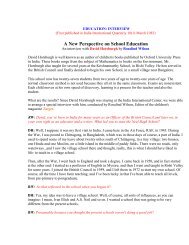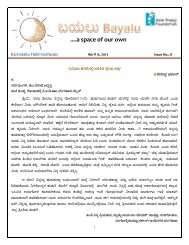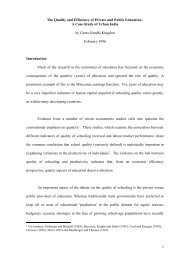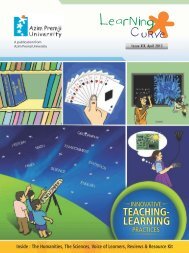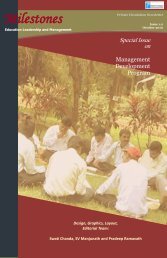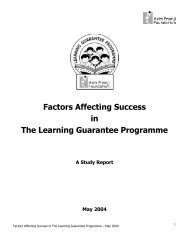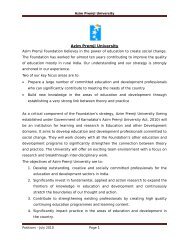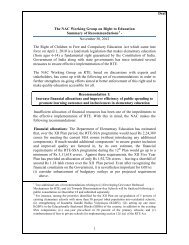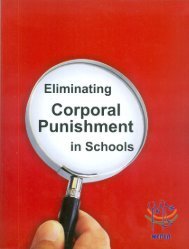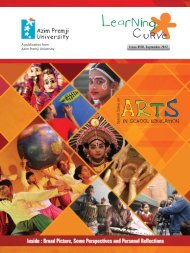Indesign Pagesnew.indd - Azim Premji Foundation
Indesign Pagesnew.indd - Azim Premji Foundation
Indesign Pagesnew.indd - Azim Premji Foundation
You also want an ePaper? Increase the reach of your titles
YUMPU automatically turns print PDFs into web optimized ePapers that Google loves.
seeing another part of the world and so we were seeing two<br />
different dimensions of the same world. This, she said, was<br />
the problem. People were seeing two different realities in<br />
the same building (mosque and temple) and that’s why they<br />
wanted to bring it down. Another ‘eureka’ moment – for the<br />
fi rst time, I realized that the same event/action can have<br />
two very different thought processes behind the supposed<br />
rationale.<br />
It felt extremely unnerving to me at that time, that there<br />
could be two groups of people believing in their own set of<br />
truths! As an adult, this has become so much more apparent<br />
and important – to realize that people operate from different<br />
contexts.<br />
I was recently on an outdoor leadership course in the US<br />
and one incident transported me back in time. There I was,<br />
with a bunch of American youngsters, roughing it out in the<br />
wilderness for 60 days! The social dynamics of the team was<br />
challenging, to say the least. At one point, folks were even<br />
upset about my mannerisms and vocabulary – I did not say<br />
‘please’ and ‘thank you’ at the drop of a hat, my expression<br />
of respect was less outwardly. And, can you believe it: this<br />
was discussed for over 2 hours in our evening meeting!<br />
Aha…different contexts again! Was I under critique thanks<br />
to my different cultural upbringing? Do we, as Indians,<br />
express ourselves as much in words? Do we communicate<br />
differently? Is it right on my part to judge anybody for<br />
their observations when I realize that my whole team was<br />
operating from a different cultural context? Social science<br />
to my rescue – and there I was completely at peace with<br />
my team mates, having realized that there was actually a<br />
cultural gap, there was nothing personal or malicious in their<br />
observations. Yet another example of how my learning from<br />
the subject enabled me to be absolutely objective about<br />
what could well have been a delicate situation.<br />
Talking about objectivity and different points of view, one vivid<br />
memory from school stands out; often the civics class used<br />
to be characterized by highly polemic positions by students –<br />
especially when it came to parliamentary democracy. Diffi cult<br />
questions about corruption, the elections, horse-trading,<br />
etc. were thrown in. But our teacher navigated through all<br />
of them beautifully. In hindsight, I realize that she gave us<br />
no answers but left the discussion open-ended. Often, we<br />
would chide her saying ‘she ought to take a stand’. Isn’t<br />
that what we were taught? Taking a stand almost seemed<br />
Section E<br />
central to survival in school - and life, I would say. As a<br />
child, often between friends one was asked ‘tell me, whose<br />
friend are you, ours or theirs?’ The answer would dictate<br />
one’s social circle. My Math teacher’s words about getting<br />
it ‘right’ or ‘wrong’ always hounded my limited imagination.<br />
I often wondered as a child, why can’t there be two right<br />
answers? Why was the world always steeped in certainty? It<br />
was always either ‘this’ or ‘that’.<br />
Perhaps this is why I enjoyed my social studies class the<br />
most – here, I was allowed to make sense of two different<br />
and confl icting viewpoints without having to defend one or<br />
the other. There was no proof to completely negate my take<br />
on things. For example, in history, I always wondered what<br />
the common man was doing when these kings fought wars<br />
and expanded their territory. I spent much time wondering<br />
if every second citizen was a soldier in olden times. Were<br />
there ordinary people like us those days – or did you have to<br />
be a noble, craftsmen, soldier or Brahmin? Did people only<br />
fi ght wars or did they also get a chance to lead a peaceful<br />
life? Why is there so little heard about the ‘dark’ side of<br />
kings? Often, these were left to my imagination with very<br />
few pointers from my teacher. The beauty was that the<br />
teacher was open to my learning new things and changing<br />
course accordingly. I was not ridiculed for ‘one right’ or ‘one<br />
wrong’. This diversity of rights and wrongs was extremely<br />
encouraging.<br />
I enjoyed my social studies class the most<br />
– here, I was allowed to make sense of<br />
two different and confl icting viewpoints<br />
without having to defend one or the<br />
other.<br />
Over time, the need to justify your stand/or your concept<br />
of ‘right’ and ‘wrong’ grew less. As years went by, and I<br />
started engaging with diffi cult questions like building dams,<br />
eradicating forests, shooting wildlife, relocating local people<br />
and tampering with conservation, my social science learning<br />
helped; it enabled me to appreciate different viewpoints<br />
and respect them. I was not compelled to stick to one<br />
Pg No: 132



